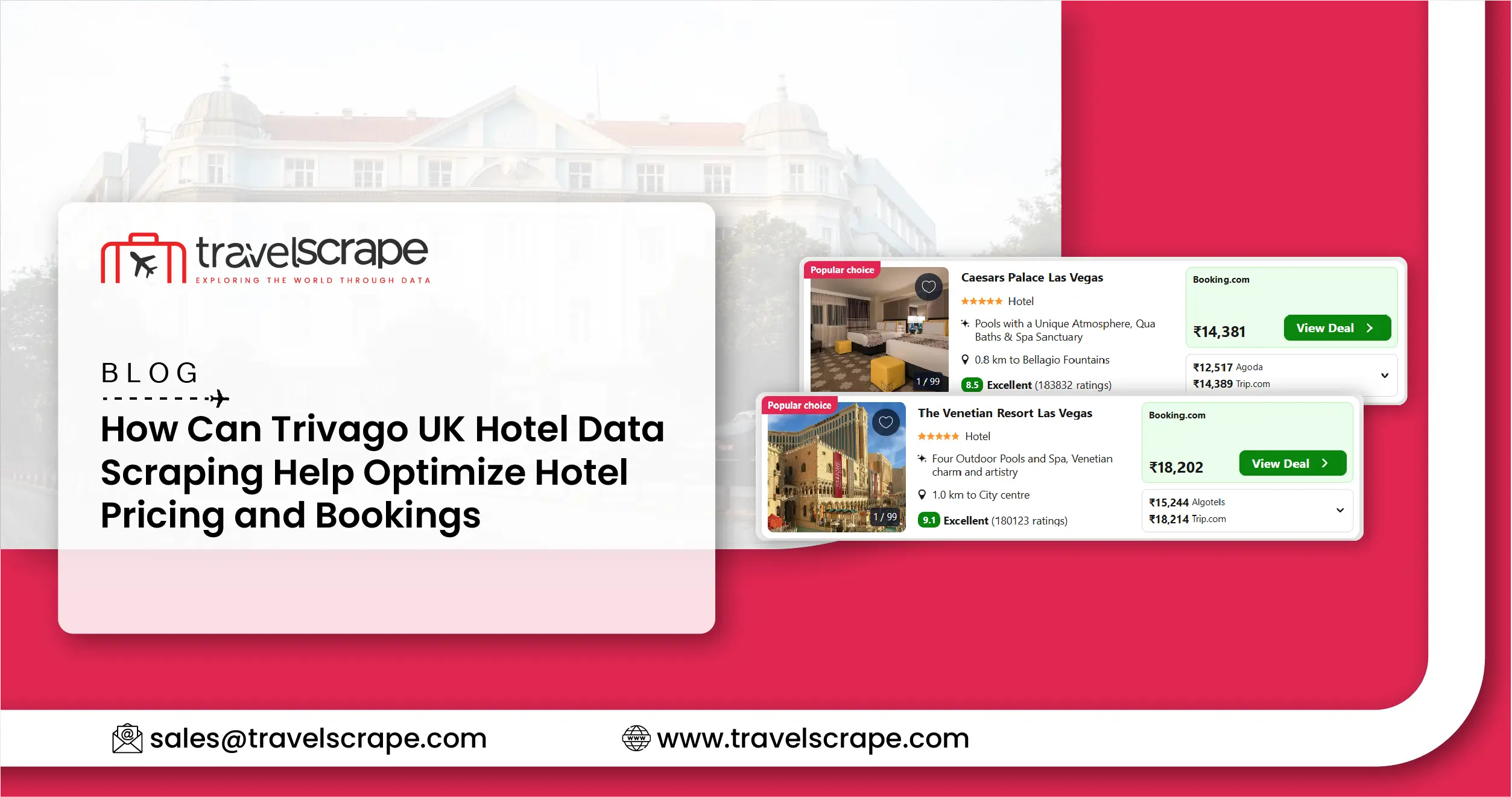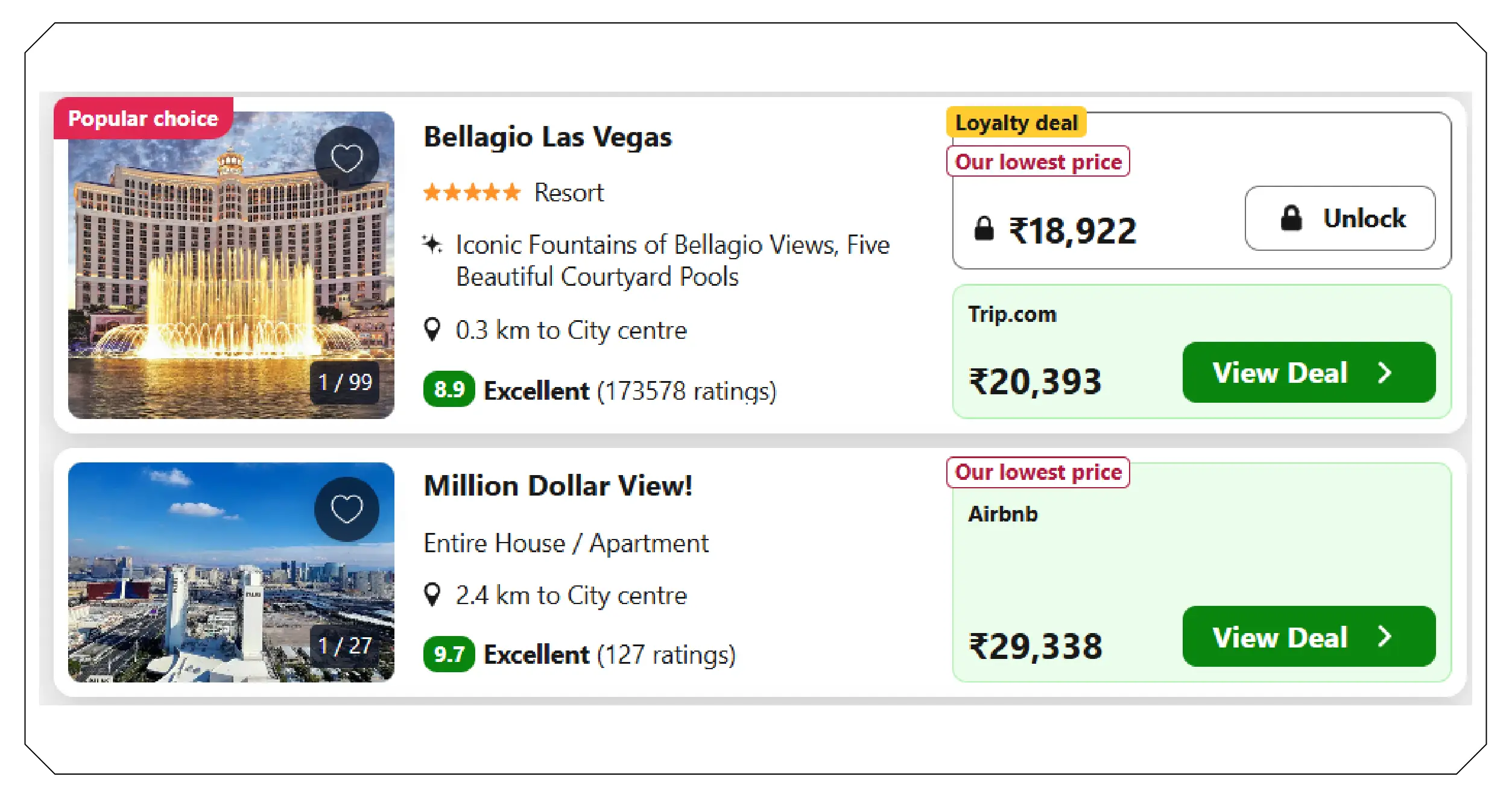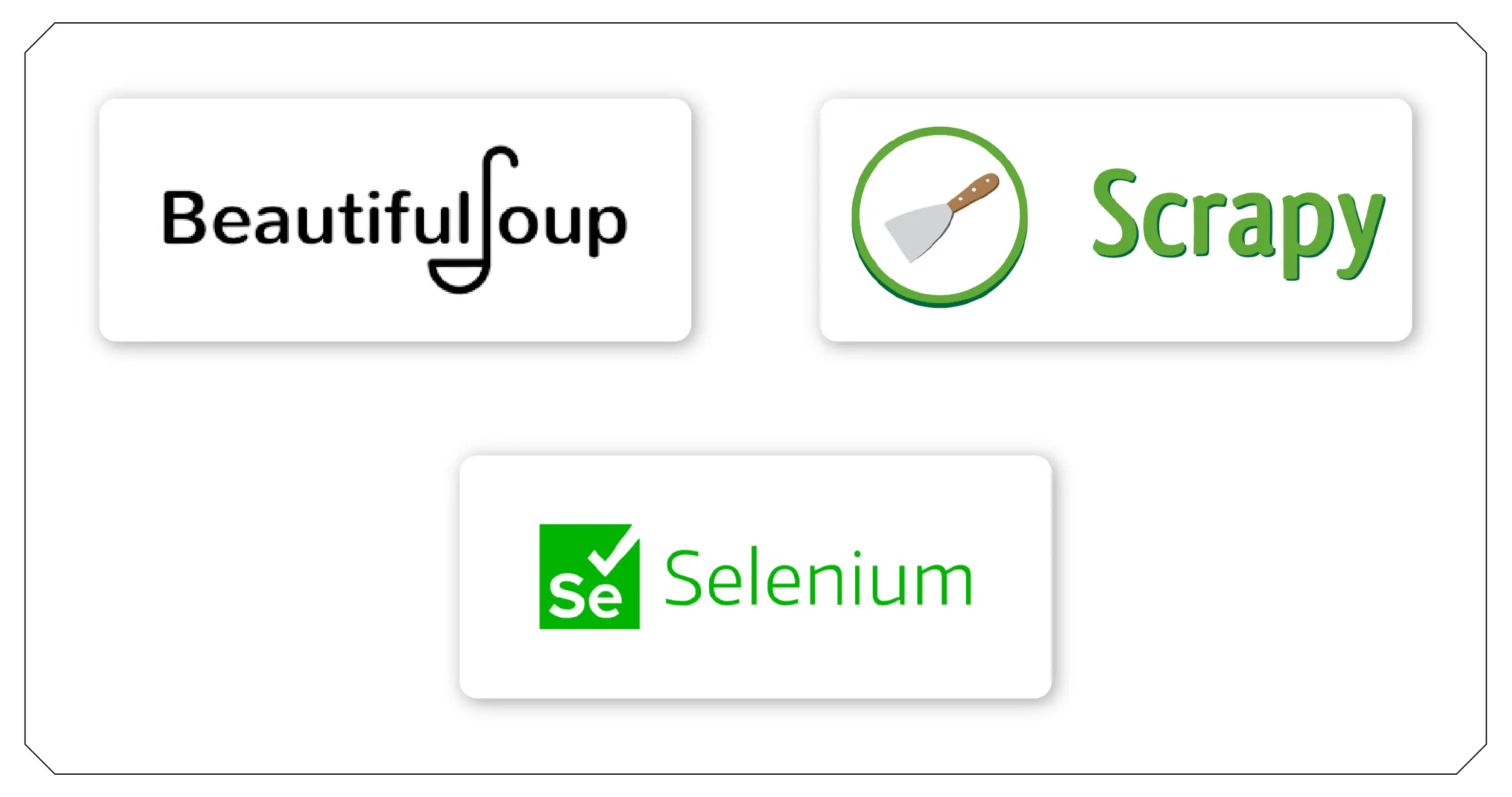How Can Trivago UK Hotel Data Scraping Help Optimize Hotel Pricing and Bookings?

Introduction
In today’s digital travel era, hotels and online travel platforms generate an overwhelming amount of data. For businesses, researchers, and travel enthusiasts, harnessing this data can reveal trends, optimize pricing strategies, and improve guest experiences. One of the most sought-after sources for hotel insights in the United Kingdom is Trivago. By leveraging Trivago UK Hotel Data Scraping, companies can extract valuable information on hotel listings, room rates, availability, and guest preferences.
A crucial component of this analysis is the Trivago Guest Reviews Dataset , which provides deep insights into customer satisfaction, service quality, and common pain points for travelers. Analyzing this dataset allows hotel operators to benchmark their performance against competitors and identify areas for improvement. Coupled with UK Trivago Hotel Rate Monitoring, businesses can also track price fluctuations over time and adjust strategies to maximize occupancy and revenue.
Why Trivago UK Hotel Data Scraping Matters?

Trivago serves as a meta-search engine, aggregating hotel offers from hundreds of booking platforms. While this makes it easier for travelers to compare options, it also creates a complex data ecosystem for analysts. Trivago Hotel Room Rates Dataset provides structured information on pricing, enabling hotels and market researchers to understand pricing dynamics across different UK regions.
Scraping Trivago data is particularly valuable because it offers:
1. Competitive Intelligence
Monitor rival hotels’ pricing, promotions, and occupancy trends.
2. Consumer Insights
Understand what guests value most, as reflected in reviews and ratings.
3. Revenue Optimization
Track seasonal trends and adjust rates dynamically.
For companies operating in the hospitality sector, the ability to Extract Trivago UK hotel prices and availability in real-time provides a strategic advantage. Not only can this help hotels remain competitive, but it also allows online travel agencies (OTAs) and data providers to deliver enriched services to end-users.
Key Components of Trivago UK Hotel Data
Trivago UK hotel data is multifaceted, consisting of several important datasets:
- Hotel Listings: Basic details including property name, address, star rating, and amenities.
- Room Availability and Rates: Daily prices for different room types, seasonal variations, and special offers.
- Guest Reviews: Feedback and ratings across various parameters such as cleanliness, service, and location.
- Price Trends: Historical data showing how room rates fluctuate over time.
By leveraging the Trivago Price Trends Dataset, analysts can identify patterns such as peak booking seasons, discount windows, and competitive pricing behavior. This is invaluable for revenue managers and dynamic pricing teams in the hotel industry.
Methods for Trivago UK Hotel Data Scraping
Scraping data from Trivago requires careful planning, compliance with website policies, and technical know-how. The following methods are commonly used:
1. Web Scraping Using APIs
While Trivago does not offer a public API for all data points, some authorized partners
can access structured APIs.
These APIs allow for systematic extraction of hotel listings, prices, and reviews.
Integrating API-based data collection
with existing systems ensures high accuracy and efficiency.
2. Automated Web Scraping
Tools and frameworks such as Python’s BeautifulSoup, Selenium, and Scrapy are often used
for scraping web pages.
This approach is beneficial for extracting unstructured information, such as hotel
descriptions, images, and dynamic pricing details.
Businesses that employ real-time Trivago UK hotel price data scraping can capture
updates as soon as they are published,
enabling instant analysis and informed decision-making.
3. Data Cleaning and Structuring
Raw scraped data often contains inconsistencies, duplicate entries, and missing values.
Cleaning this data is essential
to build usable datasets, such as Web Scraping Trivago Hotels Data , which can be fed
into dashboards, analytics tools,
and predictive models. Proper structuring ensures that insights drawn from the data are
reliable and actionable.
Applications of Trivago UK Hotel Data
Scraping Trivago UK hotel data unlocks numerous business opportunities:
- Competitive Pricing Analysis: Hotels can monitor competitors’ pricing and promotional strategies. With a comprehensive Trivago Hotel Room Rates Dataset, revenue managers can adjust their rates dynamically to remain competitive while optimizing occupancy.
- Trend Analysis and Forecasting: By analyzing historical data through the Trivago Price Trends Dataset, businesses can predict future demand patterns. For example, understanding seasonal trends in cities like London, Edinburgh, or Manchester can help hotels plan their staffing, inventory, and marketing campaigns.
- Customer Sentiment Analysis: The Trivago Guest Reviews Dataset provides insights into traveler satisfaction. Natural language processing (NLP) techniques can be applied to reviews to identify common complaints, highlight strengths, and improve service offerings. This ultimately enhances the guest experience and encourages repeat bookings.
- Market Expansion and Strategic Planning: By extracting geographic and pricing data, hotel chains can identify underserved regions and potential markets for expansion. Insights from UK Trivago Hotel Rate Monitoring allow companies to make informed investment decisions and target locations with high demand.
Tools and Technologies for Effective Scraping

Several tools can streamline Trivago UK hotel data scraping:
- Python Libraries: BeautifulSoup, Scrapy, Selenium, and Requests for web data extraction.
- Data Storage Solutions: SQL and NoSQL databases for structured and semi-structured data storage.
- Analytics Platforms: Tableau, Power BI, and Python libraries (Pandas, Matplotlib) for visualization and reporting.
- Cloud Services: AWS, Google Cloud, or Azure for scalable data collection and processing.
Implementing these tools ensures that Extract Trivago UK hotel prices and availability can be done efficiently, even for large datasets spanning multiple cities and hotel categories.
Challenges in Trivago UK Hotel Data Scraping
While the benefits are significant, scraping Trivago data comes with challenges:
- Dynamic Content Loading: Trivago pages often load data asynchronously, requiring advanced scraping techniques, such as Selenium.
- Data Accuracy: Frequent updates to hotel rates and availability demand real-time scraping to maintain accuracy.
- Legal and Ethical Considerations: Compliance with Trivago’s terms of service and regional data privacy regulations is essential.
- Data Volume: Scraping large volumes of hotel data requires robust storage and processing capabilities.
Overcoming these challenges ensures that the Trivago Hotel Room Rates Dataset and other extracted information remain reliable and actionable.
Best Practices for Trivago UK Hotel Data Scraping
1. Plan Your Objectives:
Identify which datasets
(prices, reviews, availability) are most relevant to your business goals.
2. Use Real-Time Scraping:
Frequent updates allow for
Real-time Trivago UK hotel price data scraping, which is essential for dynamic pricing
strategies.
3. Validate Data:
Regularly cross-check extracted data
against Trivago to ensure accuracy and consistency.
4. Respect Website Policies:
Avoid overloading servers
and comply with robots.txt directives.
5. Integrate Analytics:
Combine scraped data with
internal systems to generate actionable insights.
Use Cases for the Hospitality Industry
- Dynamic Pricing: Hotels can use the Trivago Price Trends Dataset to adjust room rates in response to market demand, competitor behavior, and seasonal fluctuations.
- Marketing Strategy: Analyzing guest reviews and ratings can guide promotional campaigns. For instance, emphasizing positive aspects identified in the Trivago Guest Reviews Dataset can enhance brand reputation and drive bookings.
- Inventory Management: Understanding occupancy trends and room availability helps hotels optimize staffing, housekeeping, and supply chain management. Scraping UK Trivago Hotel Rate Monitoring data can provide the predictive insights necessary for operational efficiency.
- Investment and Expansion: Investors and hotel chains can analyze location-based demand and price trends to identify high-potential areas. Trivago Hotel Room Rates Dataset enables data-driven expansion strategies.
Advanced Insights from Trivago Data
- Price Elasticity Analysis: Understand how price changes affect booking volumes across cities.
- Customer Segmentation: Identify patterns in traveler preferences, such as solo travelers, families, or business travelers.
- Sentiment Correlation: Link guest reviews to occupancy rates and pricing to understand how service quality impacts revenue.
- Competitive Benchmarking: Compare your hotel’s performance against that of competitors to refine your marketing and pricing strategies.
Future of Trivago UK Hotel Data Scraping

The hospitality industry is increasingly data-driven. With the rise of AI, machine learning, and predictive analytics, the value of Web Scraping Trivago Hotels Data continues to grow. Real-time data collection, predictive pricing, and sentiment analysis are set to become standard practices for hotels and OTAs.
Hotels that leverage Extract Trivago UK hotel prices and availability effectively can respond faster to market changes, enhance guest experiences, and improve profitability. Similarly, OTAs and travel intelligence firms can use the insights to create better user experiences and provide tailored recommendations.
How Travel Scrape Can Help You?
- Comprehensive Data Extraction: We can collect detailed hotel information, including room availability, pricing, amenities, and location, from multiple online platforms efficiently.
- Real-Time Price Monitoring: We track dynamic room rates and seasonal pricing trends to provide up-to-date insights for better revenue management.
- Guest Reviews Analysis: By scraping and structuring guest feedback, we help identify customer satisfaction patterns and areas for service improvement.
- Competitive Benchmarking: Our scraping solutions allow hotels to monitor competitors’ rates, discounts, and promotions for strategic decision-making.
- Customizable Datasets: We provide structured and clean hotel datasets tailored to business needs for analytics, reporting, and market research.
Conclusion
In conclusion, Scraping Trivago UK hotel ratings and reviews provides a comprehensive understanding of guest experiences, while the method to Extract hotel discounts from Trivago UK helps optimize pricing and promotions. Leveraging this data as part of Hotel Data Intelligence strategies empowers businesses to stay competitive, improve operational efficiency, and enhance customer satisfaction.
By adopting robust Trivago UK Hotel Data Scraping practices, which combine real-time price tracking, guest feedback analysis, and trend monitoring, hotels and travel platforms can harness actionable insights that drive revenue growth and enhance the overall travel experience.
Ready to elevate your travel business with cutting-edge data insights? Extract Aggregated Hotel Prices to identify competitive rates and optimize your revenue strategies efficiently. Discover emerging opportunities with tools to Extract Travel Industry Trends , leveraging comprehensive data to forecast market shifts and enhance your service offerings. Stay ahead of competitors by monitoring Real-Time Travel Mobile App Data , gaining instant insights into bookings, promotions, and customer behavior across multiple platforms. Get in touch with Travel Scrape today to explore how our end-to-end data solutions can uncover new revenue streams, enhance your offerings, and strengthen your competitive edge in the travel market.